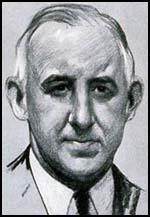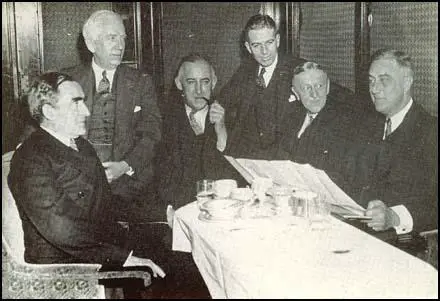Raymond Moley

Raymond Charles Moley, the son of Felix James Moley and Agnes Fairchild Moley, was born in Berea in Cuyahoga County on 27th September, 1886. Moley was educated at Baldwin-Wallace College and Oberlin College before becoming a teacher in Ohio.
In 1916 Moley was appointed instructor and assistant professor of politics at Western Reserve University. He continued his studies and in 1918 he received his PhD. The following year he was appointed director of the Cleveland Foundation. Moley joined the Barnard College faculty in 1923. Five years later he became a professor of law at Columbia University.
Moley was a member of the Democratic Party and a close friend of Franklin D. Roosevelt, the Governor of New York. Moley later recalled that he was attracted to his "vibrant aliveness, his warmth, his sympathy, his activism" rather than his policies. Roosevelt sought Moley's advice during the 1932 Presidential Election. Moley was joined by two of his university colleagues, Rexford Guy Tugwell, Adolf Berle and Roosevelt's law-partner, Basil O'Connor.
It has been argued by William E. Leuchtenburg, the author of Franklin D. Roosevelt and the New Deal (1963): "They argued economic doctrine through long spring evenings at the Governor's fireside in Albany, held audiences for economists in a hotel suite in New York City, and wrangled over drafts of campaign speeches... After the election... Moley continued to serve as minister without portfolio in the months before the inauguration; he interviewed experts, assigned men to draft bills, and hammered out the legislation of the Hundred Days."
It has been argued by Patrick Renshaw: "Politically, Tugwell was on the left with Berle on the right. Moley chaired regular meetings of the brains trust, which Samuel Rosenman and Basil O'Connor also attended. FDR was not an intellectual, but enjoyed their company and was in his element at the free-wheeling discussions which hammered out the New Deal."

Davies, Raymond Moley, Rexford Tugwell and William Woodin in 1932.
James Kieran of New York Times called Roosevelt's group of advisors as the Brains Trust. As well as Moley, Tugwell, Berle and O'Conner the group included Ernest Cuneo, Hugh Johnson, Frances Perkins , Harry Hopkins , Harold Ickes , Louis Brandeis , Cordell Hull, Henry Morgenthau, Thomas Corcoran, Robert Wagner and Felix Frankfurter .
The group disagreed about many issues. Moley argued that the government should work very closely with businessmen whereas Rexford Guy Tugwell distrusted business and placed his confidence in government planners who would administer the economy. Adolf Berle wanted the government to "evangelize the businessman rather than resort to the naked power of the state". Tugwell and Berle were also influenced by the economic ideas of J.A. Hobson and John Maynard Keynes but Moley held serious doubts about rapidly increasing government spending.
Moley wrote many speeches for Franklin D. Roosevelt and was responsible for the majority of the president's first inaugural address. He also claimed credit for inventing the term "New Deal" though this has been disputed. Moley also wrote pamphlets and articles on Roosevelt's achievements and argued that after being elected "capitalism... was saved in eight days".
Moley continued to write speeches for Roosevelt until 1936. By this time he saw Roosevelt as too left-wing and by 1937 he was attacking the government's policies in his regular column for Newsweek Magazine. He also published a highly critical account of the New Deal in his book, After Seven Years (1939). He also contributed to conservative journals such as The Freeman and The National Review.
Raymond Moley died in Phoenix, Arizona, on 18th February, 1975.
Primary Sources
(1) Raymond Moley, After Seven Years (1939)
I spent many hours talking with Huey Long in the three years before his death. When we talked about politics, public policies, and life generally, he cast off the manner of a demagogue as an actor wipes off greasepaint. There could be no question about his extraordinary mental - or, if you will, intellectual - capacity. I have never known a mind that moved with more clarity, decisiveness, and force. He was no backwoods buffoon, although when the occasion seemed to offer profit by such a role he could outrant a Heflin or a Bilbo. But the state of Louisiana reveals ample evidence of his immense contributions to the happiness and welfare of its people. As his power in that state grew to be secure and absolute, the virus of success took hold. There can be no doubt of his purposes: first, the complete consolidation of his power in Louisiana; second, his use of his forum in the Senate to grasp national attention; and, finally, to direct a campaign of national "education" through the states toward a Presidential nomination for himself at some future time.
